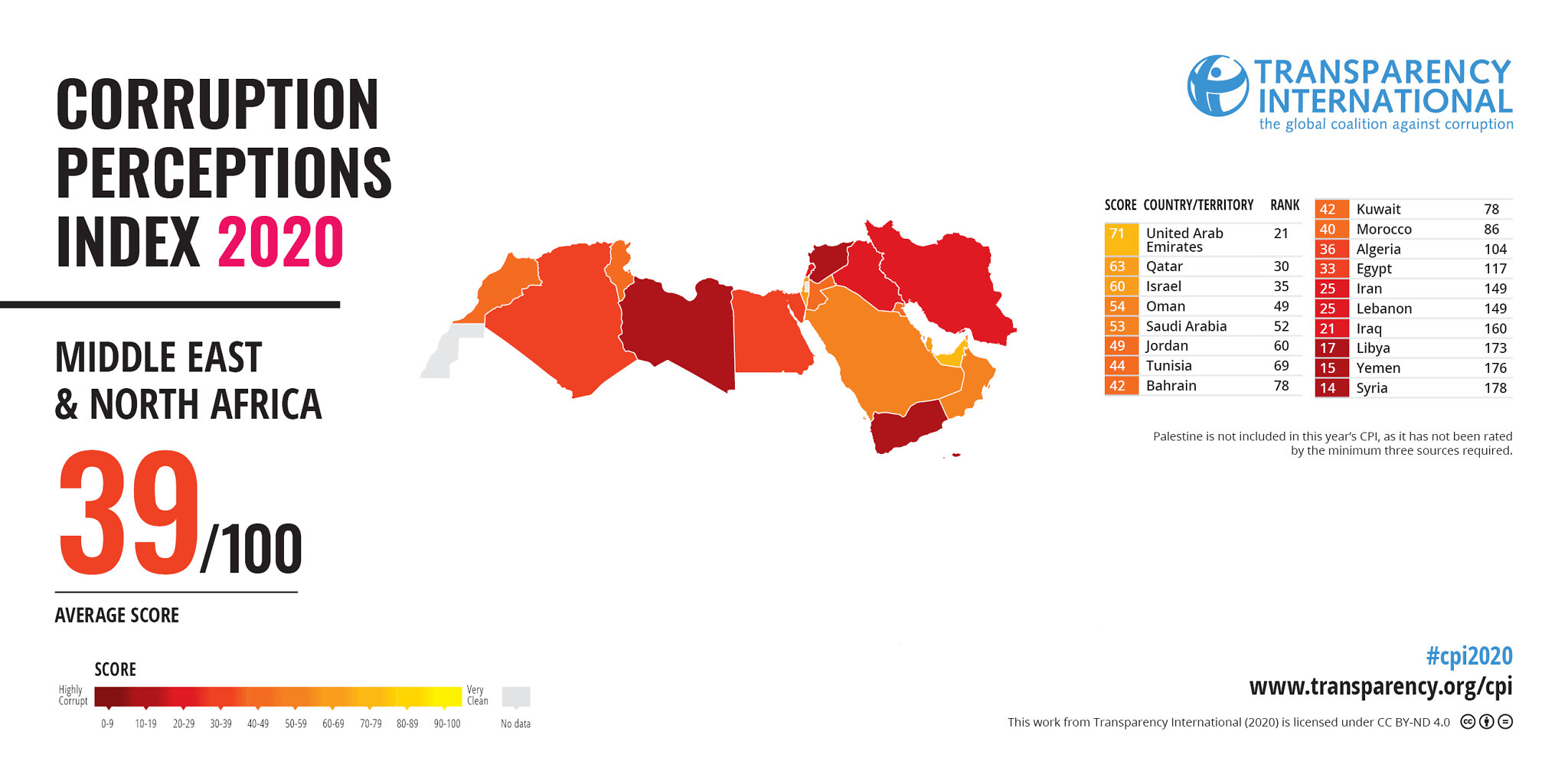
Corruption Perceptions Index 2020 Middle-East info-graphic (Transparency International)
Prof. Sam Lehman-Wilzig – Israel’s Ongoing Political Corruption: Why?
Only 75 years old, but Israel has already sent to jail one State President (Katzav), one Prime Minister (Olmert), a Treasury Minister (Hirschhorn), a Minister of the Interior (Aryeh Deri, recently convicted of additional crimes), several other Cabinet Ministers over the years, a Chief Rabbi, and now another PM is on trial for three separate offenses (Netanyahu). Why so much corruption?
I am not in any way offering an exoneration or even a justification for all of this – merely an analysis. Or I should say “analyses,” because there are several factors at work here – none more important or influential than the others.
First, Jewish Diaspora history. A people that suffered 2000 years of almost perpetual persecution – and at times even worse (exile or murder) – could not put much faith (pun intended) in the ruling government that many times initiated such oppression. The result: an evolving ethos of doing things “under the table” to circumvent the official repressive policy against the Jews.
One might think that upon establishing their own state, such an attitude would quickly evaporate, but this misunderstands “political culture” that can last for decades and even centuries (e.g., Britain’s “it’s just not done”; America’s “State’s Rights”; France’s hyper-secularism). Thus, as the saying goes: “the beat goes on” – not only among the ultra-Orthodox who don’t fully recognize the theological legitimacy of the State of Israel, but also among secular Israelis who are first, second, and third generation progeny of foreign lands from which their grandparents arrived after centuries of discrimination and worse.
A second factor is the nation’s age. Political corruption is correlated with the relative youthfulness of a country. 75 years is a lifetime for a person, but it is mere “adolescence” for a state. Just like the rebelliousness and non-normative behavior of many young people, so too young countries tend to have higher levels of non-normative behavior among the population and its leadership. A classic example is the U.S. in the mid-19th century – also around eight decades after the country’s establishment, it still had rampant corruption (e.g., New York’s Tammany Hall; Ulysses Grant’s administration with its Teapot Dome scandal).
What’s the connection? On the one hand, it takes a long time to develop stable institutional safeguards against corruption (police, judiciary etc.). On the other hand, by definition young countries are more open to immigration – and until very recently it was the poor who migrated to these “lands of opportunity” e.g., America in the 19th and 20th centuries, or “safe havens” such as Israel for the Jewish People. As a generalization (but still true), the poor tend to circumvent the “system” (e.g., America’s Jewish Mafia), and this projects upwards to the politicians as well.
A third, related factor: young countries tend to be poorer than older ones. Among other things, this means that social services will be lacking – leaving gaping holes that “the public” and their leaders will then provide in non-institutional fashion. Back in the 1980s and 1990s, Israel represented a classic case of this: a widespread Black Market (with “black dollars”); illegal cable TV wires strung across rooftops because there was only one official television channel; illegal settlements (still ongoing); and non-governmentally-supervised school systems (mostly haredi) not teaching core subjects such as math and English. Thus, when the “street” acts in non-legal fashion along a host of life areas, the political leaders will have little compunction but to follow suit – even if they are (mostly) the ones who caused the public to circumvent “the system.”
Fourth and finally, Israel “suffers” from a lack of governmental competition, despite all-too-frequent elections. From 1948-1977, the MAPAI party ruled with its coalition partners; from 1977 until today, the Likud has ruled with only a few breaks. In this, Lord Acton’s immortal aphorism is altogether too relevant: “Power corrupts; absolute power tends to corrupt absolutely.” On an individual level, if PM Netanyahu is ultimately found guilty, that would represent the quintessence of Acton’s warning, given Bibi’s six tenures in office.
To be sure, not all is gloom and doom on this issue. The fact that so many high-level political functionaries have been thrown in jail is evidence that parts of the government are fighting against political corruption with some modicum of success. Unfortunately, the downside of this is that such success brings forth governmental attempts to “tame” the anti-corruption forces – precisely what we are witnessing today in the present government’s attempts to ram through “Judicial Reform.” This involves two main pillars. First, weakening the independence of the attorneys-general of the various government departments who have served in the past as bulwarks against ministerial corruption and dubious ethical practices. Second, undermining the Supreme Court’s use of “reasonableness” when judging the government’s most egregious administrative decisions.
In short, Israel’s relative high level of political corruption should not be all that surprising, even if it is reprehensible. Based on precedents from other nascent countries, the struggle to limit it will continue for quite some time – but for now there seems to be some light at the end of the tunnel. One such bright trend is interesting: Israel has never had a female politician convicted of corruption! With more women entering politics, perhaps that in itself will lower the corruption flames. Certainly, it’s no coincidence that Israel’s two government officials at the forefront of the struggle to stop the present “Judicial Reform” are women: the Attorney General and the President of the Supreme Court. Conversely, it’s no coincidence that three of the government’s main parties either have low female representation (the Likud) or none at all (SHAS and Yahadut Hatorah).
By themselves, more women in government will not completely eliminate Israel’s political corruption. But as the years continue to pass and the country approaches “middle age,” such corruption should subside as part of the country’s “normal” maturation.







